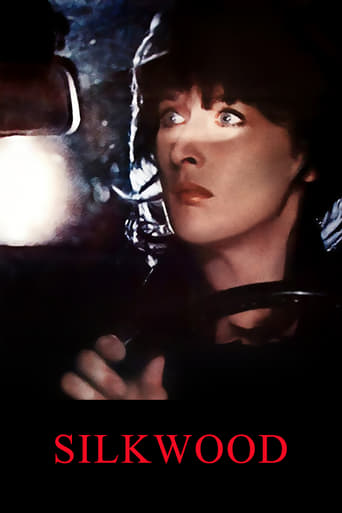Lechuguilla
The plot of "Silkwood" is fairly close to my memory of major events as they played out in Oklahoma, and reported by local news over multiple weeks. A lone individual up against a big corporation is always a compelling story. In this case, the individual, Karen Silkwood (Meryl Streep), proved morally superior to Kerr-McGee, even though the story ends tragically. This film is unusual in that the plot and characters are not exaggerated at all.Quite aside from the film's deep political and social themes, "Silkwood" excels at a personal level. All the characters are real people, and the script and actors convey deep and meaningful characterizations. This is true even of secondary characters like Thelma (Sudie Bond) and Mr. Hurley (Bruce McGill), for example. These peoples' lives are all rather common and dreary, but what a welcome change from the contrived and two-dimensional characters in most films.Detailed production design matches the dreariness and bleakness of these blue-collar workers in rural America. The naked light bulb that hangs from the ceiling in Silkwood's house; the drab green paint peeling off kitchen cabinets; that old beat-up white car Karen drives. On and on, the settings are realistic and appropriately depressing. The low-key, country/banjo score amplifies the realism of time and place, as does the old gospel hymn "Amazing Grace".Casting is ideal. I don't know how the acting could have been improved. Meryl Streep just disappears into the role of Karen Silkwood. Both Kurt Russell and Cher deserved awards. Even minor roles are well cast, and the performances are terrific.Color cinematography is quite good. Night scenes, both interior and exterior, are impressive. There's one scene in the second half where Karen and Dolly (Cher) sit out on the front porch in a swing; it's night; Dolly is crying and Karen reassures her with a soft version of the song "Hush-a-bye, don't you cry, go to sleep little baby, when you wake…". As the camera backs away, we see that drab, lonely house with a melancholy Karen and Dolly, an image that is powerfully haunting."Silkwood" conveys a highly realistic, true-life story about a very ordinary young woman who, despite personal issues and imperfections, takes big risks to do what is morally right. The film is sad, depressing, and very well made. It easily ranks among my twenty best films of all time.
ElMaruecan82
Karen Silkwood, casually chewing gum, finishes her working day by a routine cleaning task. She then leaves the room, raises her hand toward the radiation detector, as she always does, but this time, the strident alarm suddenly starts ringing, indicating that she may have been exposed to radiations. Karen tries not to panic although she's visibly shocked. And the scene cuts to the first of her three "cooking" treatments, which in nuclear jargon, means getting into a hot, long and painful decontaminating shower. That very moment is Karen Silkwood's story in microcosm, perfectly reflecting who she was and what she went through. Basically, Karen can't see the danger pending above her frail shoulders. She's not a fool but in a tragically admirable way, she is just blinded by her own integrity. Later in the film, she just enters the door, and the sound startles us again, we have a quick glimpse on the "Danger Radiation" signal, then it cuts to her cries of fear and disbelief under the hot shower, again. The sad irony is that Karen tried to apply some cleansing on the field of ethics, in the Nuclear factory she worked in, but the more she tried, the more tortured she was by the 'invisible enemy'. And the frequency of the shower scenes plays like the omen of a series of misfortunes leading up to a tragic conclusion, the ultimate 'cleaning'. Indeed, we all know that Karen Silkwood died in a mysterious car accident, so the shower scenes, each time more intense and haunting, marks the beginning of the end for Karen Silkwood. But as aware as we are about the facts, there's something in Karen's portrayal by Meryl Streep and in Mike Nichols' sober directing that don't get us prepared to it. Karen is no more idealistic than any other, she lives her life, she jokes and smokes, a lot as a matter of fact, she enjoys flirting, teasing her friends, she's like any small-town girl of her generation. "Silkwood" borrows many elements from 70's dramas like "Serpico", "Norma Rae" or "The China Syndrome", movies featuring ordinary persons, so dedicated to their job they couldn't close their eyes on some unethical practices and made outcasts of themselves by blowing the whistle.Karen belongs to America's struggling, unorganized working class. Her three children live with her ex-husband, and she shares a ramshackle house with her boyfriend Drew and lesbian friend Dolly, superbly played by Kurt Russell and Cher. As to emphasize the fact that the factory nourishes the town, they also happen to be co-workers. Indeed, whether a cotton mill or corporate police, the factory producing plutonium fuel rods for nuclear reactors, is only the setting and the film deals with a sincere austerity a slice of American workers' ordinary lives in a crisis-stricken America, with a more dramatic turn since it's a life-and-death situation, governed by pure profits' motives. When the plant falls into an important contract and workers are forced to work over hours and falsify some records, the effect on their health is perceived as minor collateral damage, a chance even workers are ready to take, because at least, their wages is a valuable certitude. "Silkwood" chronicles Karen's double evolution: her ascension from a worker to a union activist, traveling to Washington, interacting with union officials, testifying before the Energy Atomic Commission and revealing that some records are altered. And in the same time, there's a descent into the outcast status, making her more and more undesirable, but in the meantime, more and more determined to conduct the investigation on her own. Karen died the night she was supposed to give documentation to New York Times reporter but none of it was found in her crushed car, except convenient hints indicating that she was drugged and 'fall in sleep" while driving. From all the previous heroes I mentioned, Silkwood is the most tragic character because she paid the highest price. And what makes the story so heart-breaking is that it's not until it's too late, that she realizes she's been sailing on trouble waters. I'm still haunted by the last shot of Karen blinded by headlights on her rear view mirror. Is she worried, surprised? or does she literally see the light, realizing where her fight has lead up and is probably aware of what's awaiting her? We're only left with our sorrow, sadness and disbelief shared by her co-workers and friends when the crushed car is dragged to town. And it's the bold and abrupt realism that emotionally enhances the film, it's set in 1974, but the feeling is so authentic I felt like it was made in 1974.Nichols' doesn't stylize the film, shot like a documentary. The big corporations aren't vilified as Karen isn't romanticized either. The only time the 'David vs. Goliath' aspect of her fight is hinted is when she looks for retouched negatives of faulty fuel rods and is confronted by Craig T. Nelson. She tells him she's looking for her pills, but the intimidating towering presence of Nelson accentuates Karen's vulnerability and provides the first hints of danger.Realistic dramas like "Silkwood" can only rely on performances and Meryl Streep dilutes herself as Karen Silkwood. She wasn't thirty in "Kramer vs. Kramer" but she conveyed a classy maturity, she's older in "Silkwood" but she looks like a 28-year old woman with that mixture of tenderness and carelessness, and so deeply rooted altruism. I didn't know Meryl Streep could look so adorable, so childish, being sometimes naughty, yet revealing a stronger side than anyone, something she didn't knew she had. That's the stuff heroes are made on and I was sad to see that Karen Silkwood was only listed as 47 on AFI's Top 50 Heroes, so far below Norma Rae (#17) and Erin Brokovich (#31), especially since the reason why I loved "Silkwood" is precisely why I didn't like "Erin Brokovich".
Red_Identity
I think the advertising for this is very, very misleading. The poster on wikipedia makes it seem like a thriller, a crime story, and the summary here on IMDb isn't much better. It's just not that up-front about the things happening. I don't know if everything shown in the film is exactly like it happened in real life, but it's definitely a very realistic story about a woman trying to get answers and then finding her demise, except we don't know for sure if her car accident really was just that, an accident, or the work of other people trying to get rid of a woman looking for the truth in dangerous places. Regardless, Streep is marvelous here, deeply embodying that Oklahoma accent with perfection and playing a character that we've never seen her play before.






